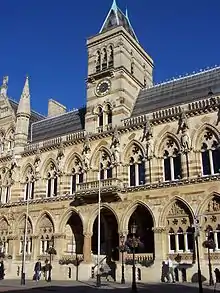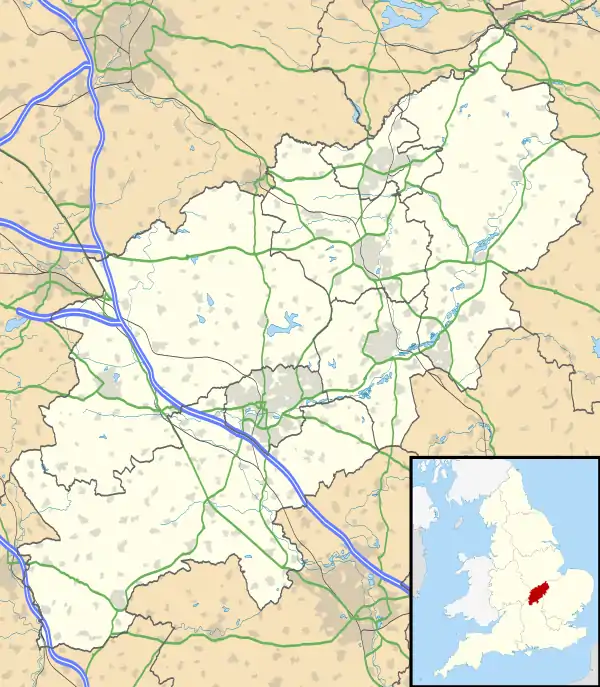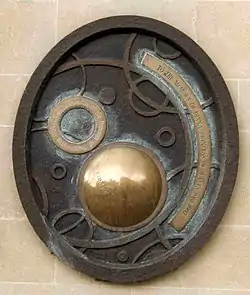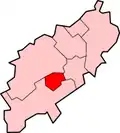Northampton Guildhall
Northampton Guildhall is a municipal building in St Giles' Square in Northampton, England. It is a Grade II* listed building.[1]
| Northampton Guildhall | |
|---|---|
 | |
| Location | Northampton, Northamptonshire |
| Coordinates | 52°14′14″N 0°53′41″W |
| Built | 1864 |
| Architect | Edward William Godwin |
| Architectural style(s) | Gothic Revival style |
Listed Building – Grade II* | |
| Designated | 19 January 1952 |
| Reference no. | 1052399 |
 Location of Northampton Guildhall in Northamptonshire | |
History


The first guildhall in Northampton was a 12th-century building at the junction of Gold Street and Horsemarket.[2] The second guildhall was an early 14th-century battlemented structure at the corner of Abington Street and Wood Hill; it was sold in 1864 and subsequently demolished.[2][3]
The current building, the third guildhall, designed by Edward William Godwin[4] in the Gothic Revival style, was officially opened on 17 May 1864.[5] The original part of the building was symmetrical with three first-floor windows either side of the main entrance.[6] The building was extended to the west to the designs of A W Jeffrey and Matthew Holding in 1892, creating a frontage of 14 bays with arcading on the ground floor and windows above on the first floor.[1] The sculptor R.L. Bolton was commissioned to design 14 statues of monarchs and other famous people which were erected on the front elevation between the windows on the first floor.[5] A modern extension to the east, built to accommodate the expanding office needs of Northampton Borough Council, was completed in 1992.[5]
Inside, the great hall displays murals of famous local men, painted by Colin Gill in 1925.[4] It also contains murals of The Muses Contemplating Northampton, painted by Henry Bird in 1949.[7][8] A statue by Sir Francis Chantrey of Spencer Perceval, Member of Parliament for Northampton and the only British Prime Minister to have been assassinated, was originally unveiled in 1817 and is also on display inside.[1][9]
A plaque on the eastern extension marks the fact that Diana, Princess of Wales, was made a Freeman of the Borough of Northampton in 1989, marking her and her family's strong connections with the town and with Althorp where she was brought up and is buried. The plaque below the memorial reads: "The memorial above was unveiled by the 9th Earl Spencer in memory of his sister, 7 November 2002 in the presence of the Mayor of Northampton, Michael Geoffrey Boss".[10] A series of bronze statues of Northampton's "history makers", cast by the sculptor Richard Austin, were unveiled in the courtyard outside the guildhall in July 2017.[11]
References
- Historic England. "Guildhall, Northampton (Grade II*) (1052399)". National Heritage List for England. Retrieved 26 August 2019.
- "'Northampton', in An Inventory of the Historical Monuments in the County of Northamptonshire, Volume 5, Archaeology and Churches in Northampton". London: British History Online. 1985. pp. 321–397. Retrieved 4 August 2020.
- "Northampton Guildhall". Open Plaques. Retrieved 4 August 2020.
- Pevsner, Nikolaus; Cherry, Bridget (revision) (1961). The Buildings of England – Northamptonshire. London and New Haven: Yale University Press. pp. 325–6. ISBN 978-0-300-09632-3.
- "The History of the Guildhall" (PDF). Northampton Borough Council. Retrieved 4 August 2020.
- "1864 – Northampton Guildhall, Northamptonshire". Archiseek. Retrieved 4 August 2020.
- Mayes, Ian (11 May 2000). "Obituary: Henry Bird". The Guardian. Retrieved 26 August 2019.
- "Henry Bird". Hatfield Hines. Retrieved 4 August 2020.
- Chantrey, Francis Leggatt. "Spencer Perceval (1762–1812)". Art UK. Retrieved 4 August 2020.
- "Diana memorial unveiled". BBC News. 7 November 2002. Retrieved 26 August 2019.
- "Northampton's history makers cast in bronze for new £44,000 borough council art installation". Northampton Chronicle. 3 July 2017. Retrieved 4 August 2020.
External links
![]() Media related to Northampton Guildhall at Wikimedia Commons
Media related to Northampton Guildhall at Wikimedia Commons
